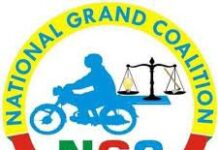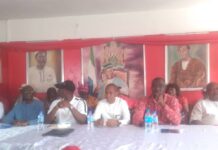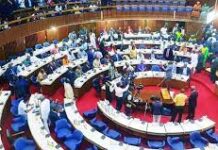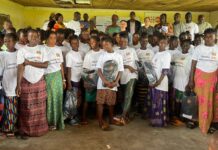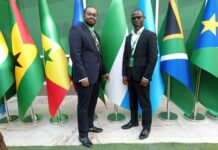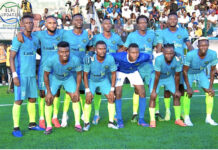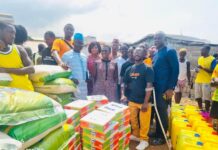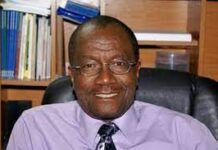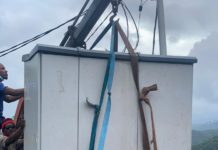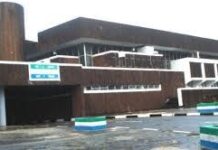By Chernoh Alpha M. Bah, Matthew Anderson, and Mark Feldman
In early September 2022, Africanist Press published documentary evidence which showed that the Electoral Commission of Sierra Leone (ECSL) awarded two procurement contracts worth over US$10 million to two Freetown companies that did not show technical capacity to supply the requested voter registration technology and software for the country’s upcoming elections in June 2023.
ECSL awarded Infinity Information Communication Technology and General Merchandise an US$8.5 million contract to supply laptop computers, fingerprint scanners, and associated accessories, and another US$1.2 million contract to Felicity Solar Technology (SL) Limited for the purchase of 1,850 portable rechargeable solar-powered generators and 1,850 extension cords with surge protector accessories. Both Infinity ICT and General Merchandise and Felicity Solar Technology were selected in April 2022 from among 13 other companies that submitted bids to the ECSL to supply technology equipment and software (computers, solar-powered generators, and accessories) to undertake a national voter registration exercise in Sierra Leone ahead of the 2023 general elections.
ECSL placed the request for contracts NEC/DMVR/ICB/G/2022/0063 on public notice on 21 February 2022, inviting eligible companies to submit sealed bids for the supply of 2000 laptop computers (2TB), 2000 laptop-carrying boxes, 2000 fingerprint scanners, 2000 USB flash drives (128GB), 500 external hard drives (4TB), and a list of other voter registration accessories and software. Thirteen companies submitted bids, including Bintex Incorporated Ltd, Conciel Ltd, FutureCom Enterprises, A. A Enterprises, Orchid Ventures Limited, Amsoft Technologies and Innovation Ltd, Gladiators Technology and General Services Limited, Axon Consortium, Steps Trading, Tiwaii Memory Masters Limited, Intelligent Card Production Systems Limited, Infinity ICT and General Merchandise, and Larubasa Investment (Ghana). In late April 2022, ECSL’s Executive Secretary William Addo-Davies informed bidding companies that the Commission granted Infinity ICT and General Merchandise the contract because the company submitted the lowest bid.
“We hereby announce our intent to award the contract to Infinity ICT and General Merchandise having being evaluated as the lowest response bidder [emphasis added] in accordance with the criteria stated in the bidding document,” William Addo-Davies wrote on 29 April 2022.
ECSL stated that Infinity won the contract based on lowest bid criteria, although documents uncovered by Africanist Press on the evaluation process show that Infinity’s proposed contract offer of US$7,475,700 was higher than the amounts offered by at least two other companies, Orchid Ventures (US$7,186,626) and Bintex Incorporated Ltd (US$5,800,700). These two companies matched Infinity ICT and General Merchandise on all seven criteria points used to evaluate the bids. In a normal bidding process, these criteria would lead to the selection of Orchid or Bintex, or plausibly, to an invited additional information process.
Africanist Press discovered in September 2022 that ECSL made false declarations when it stated that Infinity ICT and General Merchandise was awarded an US$8.5 million contract because it was the lowest bidder. Evidence already published by the Africanist Press showed that the rejected companies were more qualified than Infinity and had more proven capabilities and lowest bid offers. We also showed that Infinity’s bid documents showed no other competitive advantage over the other companies. We already published the bid evaluation document on the Africanist Press website showing this evidence.
We highlighted specifically that invoice #637 shows that ECSL processed a payment request from a company they did not contract for the said project. This invoicing arrangement further illustrate the fact that ECSL deliberately awarded Infinity an 80% inflated contract knowing fully well the company does not have the technical capacity to undertake the contract.
In this publication, we release additional documentary evidence showing that the US$8.5 million contract awarded to Infinity was grossly inflated by ECSL even though Infinity lacked the proven technical capacity to supply the requested voter registration technology as stated in the bid documents. Thus, along with the additional documentary evidence, we also provide the following information to offer more clarity on the subject.
Africanist Press discovered that the third-party supplier, Laxton Group which was allegedly subcontracted through Infinity ICT and General Merchandise, to deliver the voter registration equipment and software was paid four times lower than the listed contract price of US$8.5 million paid to Infinity. After reviewing invoices and financial correspondence, we found that Laxton accepted the subcontract, which is to cover the entire procurement, for US$2,247,100. This amount is nearly 80% lower than the proposed contract price of over US$8.5 million awarded to Infinity ICT and General Merchandise for the same project. Thus, we discovered a difference of US$6.3 million between the US$8.5 million that ECSL claimed was paid to Infinity and the US$2.2 million in the submitted invoice they processed in the name of the Laxton Group, the supposed subcontractor.
Africanist Press also found that a specific invoice #637 issued on 14 June 2022 in the name of the Laxton Group requested from ECSL the amount of US$224,710.00 as 10% advance payment on the voter registration contract even though ECSL did not directly contract the said Laxton Group. Again, the listed contractor that was awarded the US$8.5 million contract was Infinity and not the Laxton Group. In essence, invoice #637 shows that ECSL processed a payment request from a company they did not contract for the said project. This invoicing arrangement further illustrate the fact that ECSL deliberately awarded Infinity an 80% inflated contract knowing fully well the company does not have the technical capacity to undertake the contract.
Africanist Press examined correspondence by ECSL’s Executive Secretary, William Addo-Davies dated 15 June 2022, which instructed Bank of Sierra Leone (BSL) officials to transfer the amount of US$213,963.00 from ECSL/NEC’s BSL Account # 0112008440 to Infinity ICT and General Merchandise’s USD Account # 003 001100165412164 held at the Sierra Leone Commercial Bank in Freetown. Central Bank records show that BSL transferred the requested funds to the Sierra Leone Commercial Bank on 16 June 2022 (at about 12:15PM) in Sierra Leone. Oddly enough, this transaction shows that even though the said payment was in response to the Laxton Group invoice #637, in processing the payment, ECSL directed BSL to lodge the transfer into Infinity’s SLCB Account. This further raises two unresolved issues that points to the inflated contract and the authenticity of the invoice itself. Firstly, if ECSL was making a 10% advance payment to Infinity, then the US$213,963.00 from ECSL/NEC’s BSL Account #0112008440 that was transferred to Infinity ICT and General Merchandise’s USD Account # 003 001100165412164 held at the Sierra Leone Commercial Bank in Freetown shows that the actual value of the contract was US$2.2 million instead of the stated US$8.5 million.
Thus, there is a difference of US$6.3 million that ECSL officials have not accounted for in the contract awarded to Infinity. Secondly, even though ECSL processed a payment for an invoice allegedly submitted by the Laxton Group, the funds were directly paid to Infinity instead of Laxton Group. This transactional process further proves that ECSL did not only inflate the contract by US$6.3 million, but ECSL also used an invoice of a non-existing company to transfer funds from the BSL to a private company without justification. In other words, the stated reasons for the transactions and the documentary evidence of the transaction starkly contradict each other. This irregular process of financial transactions and fund transfers were again evident in a transaction carried out on 29 June 2022, when ECSL requested BSL to pay another US$409,294.58 through SWIFT transfer (via Standard Chartered Bank South Africa – SCB/SA) in the name of Infinity as additional payment of 20% on the said contract.
Africanist Press also examined the National Public Procurement Authority (NPPA) database on awarded contracts in FY2022 and found discordance between NPPA’s records on the contracts and ECSL’s financial records for the same contracts awarded to Infinity and Laxton Group. ECSL’s financial documents show that an US$8.5 million contract was awarded to Infinity which, in turn, subcontracted Laxton on a US$2.2 million offer on the same contract. However, the NPPA database suggests that Infinity had a separate contract of US$8.5 million and Laxton had a separate contract of US$2.2 million, which means that ECSL spent US$10,844,155 on laptop computers, fingerprint scanners, and associated voter registration software alone. This contradicts the information on the bidding documents and ECSL’s financial records. Thus, the NPPA database on the contracts contain details that contradict detailing of the bidding notices and ECSL financial transactions relating to the payments.
Also, NPPA, in its efforts to cover-up the ECSL scandal, presented procurement details that does not match the details on the ECSL bid notice and BSL’s payment records for the said contracts, thereby raising a crucial question on whether the more US$10 million was used for the stated purposes. For example, NPPA’s records on the contracts claim that ECSL awarded the said contracts in January 2022 when in fact the bid notices for the said contracts were only advertised in late February 2022. Most importantly, the contracts were awarded in late April 2022 in contrast to the January 2022 date stated in the NPPA database. This shows that the contract details in the NPPA database were not referring to the same voter registration contract that ECSL awarded to Infinity in April even though both records contain the same procurement numbers and companies. Interestingly, NPPA has deleted the contradicting record from their database. Evidence of the entries were recorded by Africanist Press before NPPA erased them from their database. In a subsequent report, we will publish this erased database evidence to demonstrate the effort by NPPA to cover-up the ECSL corruption scandal.
Considering the above, Africanist Press makes the following conclusions:
One, that the Electoral Commission of Sierra Leone (ECSL) corruptly awarded two procurements contracts worth over US$10 million to two Freetown companies that did not show technical capacity to supply the requested voter registration technology and software for the country’s upcoming elections in June 2023. These procurement irregularities have grossly marred the voter registration exercise in Sierra Leone.
Two, that despite the conflicting documentary evidence showing that over US$10 million in electoral funds had been misappropriated in the name of procurement of technology for the voter registration exercise, Africanist Press found no evidence that the supposed registration equipment was delivered.
Three, that ECSL is yet to provide documentary evidence showing that Infinity Information Communication Technology and General Merchandise, which was offered US$8.5 million contract to supply laptop computers, fingerprint scanners, and associated accessories had actually delivered the voter registration equipment. Likewise, ECSL is yet to submit evidence that Felicity Solar Technology (SL) Limited which was similarly offered another US$1.2 million contract for the purchase of 1,850 portable rechargeable solar-powered generators and 1,850 extension cords with surge protector accessories had also delivered the listed equipment and materials.
Four, that invoices and payment records of ECSL on contract NEC/DMVR/ICB/G/2022/0063 clearly show evidence of an inflated amount to the tune of US$6.3 million, which the ECSL leadership and its procurement department need to account for. In other words, even where the listed equipment was delivered, ECSL’s transactions still show that over US$6.3 million on contract NEC/DMVR/ICB/G/2022/0063 remains unreflected in the payment records.
Five, that the conflicting details between NPPA’s database and ECSL’s bidding and financial records on the said contracts clearly points to a joint institutional effort to cover-up the biggest corruption in Sierra Leone’s election history, which warrants an anti-corruption investigation. The NPPA’s effort to erase the evidence from the agency’s database further accentuates the irregulates surrounding the bidding and procurement arrangement. This also challenges the credibility of both ECSL as the national election management institution, and NPPA as the national procurement regulatory agency. That the Sierra Leone Parliament – especially the opposition parliamentary leaders – clearly have a case of grand corruption that they must probe. ECSL’s procurement scandal would potentially undermine the credibility of the 2023 elections, and the entire public elections infrastructure in Sierra Leone, if this is not genuinely and speedily investigated.
We attach with this report the Laxton Group Invoice and ECSL Payment Instruction as documentary evidence to illustrate the evidence upon which this report is based.





